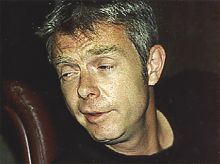What are the main differences between film and theatre?
Obviously, because this is my first film I don’t have huge experience of working in the movies but it seems to me that there is not much of a relationship between the two at all. They seem to be entirely different disciplines. The only thing I think you can bring as a theatre director, and I say this very sensitively, is an awareness of story and that I’ve worked with actors all my life, that’s it really. Everything else is entirely new.
The main difference really, without getting too technical about it, is that all theatre methodology and working with actors is predicated on the idea of repeated action. In other words, the actor has to repeat the action night after night and performance after performance: in film this is not true, when working with actors in movies you are after a moment. The actor isn’t in charge of the rhythm nor the story - I’m in charge - whereas on stage the actor must tell the story and the story’s rhythm is also determined by the actor on stage. This also means that you can use other methodologies to get them to do what you want. Also you have a totally different way of working with kids, they don’t need know about any of the usual difficulties and they only need to take responsibility for a minute moment. Would you say that with the likes of yourself, Warchus, Hytner, Mendes and even Figgis, that theatre has become in the UK, like the BBC was, a training ground for the movies?
No. I think that the idea that theatre has become a training ground for film is ludicrous. Theatre is its own brilliant, fantastic world with its own set of rules and its own joys and delights. There is a little bubble at the moment with theatre directors moving over to movies I don’t know why. What’s interesting is this generation of directors, in so much that we are all aware of one another, we know and help each other. But there have been other moments where this has occurred, perhaps the most famous was, again out of the Royal Court, in 1960’s with Woodfall Films and the likes of Tony Richardson, Karel Reisz and Lindsay Anderson, all that lot. I think it happens because the opportunity is there. I hear that you stepped down as artistic director of the Royal Court because you wanted to pursue movies. Is that the real reason?
I don’t whether I put it like that. I said I didn’t want to stay at the Royal Court because I think I would have been there for too long. Apparently the natural thing to do as I was rebuilding the theatre was to leave when it opened but that would have sent the theatre into a crisis. I had to time it so that my successor was up and running so that when the new theatre opened there wouldn’t be an evacuation of all the artistic staff. Do you think that the success of Mendes added any pressure to your production?
I think that out of our generation the ‘uncle’ is Nick Hytner because he was the first one to do it. Nick is an incredibly helpful and generous man and so we’ve all referred to Nick in our short careers, he’s been incredibly helpful. Because it’s a group of people that know each other quite well it’s a collegiate atmosphere and there’s no rivalry, so no pressure really.  |